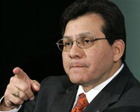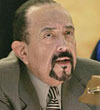|
|
|
Oregon House passes same-sex civil unions bill
Law Center |
2007/04/18 14:21
|
| A gay rights bill that would allow same-sex couples in Oregon to enter into contractual relationships affording them the benefits available to married couples passed in the Oregon House of Representatives Tuesday. A second piece of legislation protecting individuals against discrimination based on sexual orientation also passed in the state House. That bill would ban discrimination in employment, housing, and public accommodations, and create a civil cause of action for violations of the act. Both gay rights bills are expected to pass in the Oregon State Senate, and Gov. Ted Kulongoski has already announced his support for the legislation. Last week, the Washington State House of Representatives approved a domestic partnership bill (SB 5336) that grants same-sex couples hospital visitation rights, inheritance rights when there is no will, and the power to authorize medical procedures, such as organ donation and autopsies. Earlier this month, the New Hampshire House of Representatives passed a bill to allow civil unions for gay and lesbian couples.
|
|
|
|
|
|
|
U.S. Senate committee modifies earmark rules
Law Center |
2007/04/18 07:00
|
US Sen. Robert Byrd (D-WV) announced Tuesday that the Senate Appropriations Committee he chairs has agreed to adopt new standards governing so-called earmarks inserted by legislators into bills to fund special spending projects. The proposed ethics and earmark reform legislation will define the term "earmark" and will require that all earmarks be clearly identified in the committee bill and report, both of which will be published on the Internet. In addition, the legislation will mandate that Senators certify that neither they nor their spouses have a financial interest in any earmark. Byrd said the Senate Appropriations Committee will follow the standards until they are enacted into law. The Legislative Transparency and Accountability Act of 2007 passed by the US Senate in a 96-2 vote in January proposed similar earmark reform rules, but that legislation has yet to receive approval from the US House of Representatives. In September, the US House adopted a new rule requiring lawmakers to disclose their sponsorship of earmarks. H.Res. 1000 provides that earmarks can no longer be inserted anonymously and requires that bills coming out of committee, bills containing tax measures, and conference reports list all earmarks and the names of the congresspersons who requested them. |
|
|
|
|
|
|
Attorney General Gonzales defends prosecutor firings
Law Center |
2007/04/15 13:50
|
| Attorney General Alberto Gonzales, fighting to save his job, said in prepared Senate testimony Sunday he has "nothing to hide" in the firings of eight federal prosecutors but claimed a hazy memory about his involvement in them. Two Republican senators said Gonzales has yet to shore up his credibility amid shifting explanations of his role in the dismissals. Vice President Dick Cheney reaffirmed White House support for the attorney general — but left it to Gonzales to defend himself to lawmakers who have called for his resignation. In his 25-page statement, Gonzales apologized for embarrassing the eight U.S. attorneys and their families by letting their ousters erupt into a political firestorm that has engulfed the Justice Department since January. He maintained the firings were not improper, but said he remembers having only an indirect role in the plans beyond approving them. "I have nothing to hide, and I am committed to assuring the Congress and the American public that nothing improper occurred here," Gonzales said in prepared testimony released before he appears Tuesday before the Senate Judiciary Committee. The panel, which oversees the Justice Department, is investigating whether the firings were politically motivated. "I am sorry for my missteps that have helped to fuel the controversy," he said. Gonzales added: "In hindsight, I would have handled this differently. ... Looking back, it is clear to me that I should have done more personally to ensure that the review process was more rigorous, and that each U.S. attorney was informed of this decision in a more personal and respectful way." |
|
|
|
|
|
|
Bush to allow cell research on unviable embryos
Law Center |
2007/04/10 23:13
|
President George W. Bush will sign off on a bill providing funding for studies on embryos incapable of further development, but will refuse to endorse legislation that would subsidize stem cell research the White House announced Tuesday. The administration said in a formal policy statement sent to Congress that Bush would veto the Stem Cell Research Enhancement Act of 2007 because the law would "pay for research that relies on the intentional destruction of human embryos." The White House also said, however, that Bush would support the HOPE Act because it would provide funding for research into pluripotent stem cells that does not entail the destruction of embryos. In July, Bush vetoed the Stem Cell Research Enhancement Act of 2005 saying he refused to provide federal funding for stem cell research because many people consider the destruction of embryos murder. Simultaneously, Bush signed the Fetus Farming Prohibition Act, intended to prohibit "fetal farming," the method of creating fetuses for the sole purpose of research, after both the House and Senate passed the bill unanimously. |
|
|
|
|
|
|
DC Appeals Ruling Overturning Handgun Ban
Law Center |
2007/04/10 09:29
|
| The city government of Washington, DC on Monday asked the US DC Circuit Court of Appeals for an en banc rehearing of a case that led to a controversial ruling last month invalidating the city's handgun ban. City lawyers warn that the current ruling "severely limits" the ability of local and federal legislatures to regulate firearms to protect citizens and law-enforcement officers. By a 2-1 panel vote in March, the judges deciding Parker v. District of Columbia relied on the Second Amendment to overturn a 31-year old ban on handguns in the District of Columbia. Mayor Adrian Fenty and the city argued that the panel's interpretation of the Second Amendment is "contrary to of nearly every other federal court of appeals, as well as the highest local court in this jurisdiction." The case is widely expected to end up before the US Supreme Court, regardless of who ultimately wins in the DC Circuit Court. |
|
|
|
|
|
|
State Sen. Wayne Bryant pleaded not guilty
Law Center |
2007/04/10 00:01
|
One of the most powerful politicians in Southern New Jersey pleaded not guilty to federal corruption charges. Senator Wayne Bryant is accused of using his clout as head of the Senate Budget Committee to steer millions in grants to two state schools that gave him no-show jobs. During a court hearing this morning in Trenton, Bryant pleaded not guilty to the fraud, bribery and pension-padding allegations. Also charged in the case is former UMDNJ Dean R. Michael Gallagher of Haddonfield. He also entered a not guilty plea Monday, as expected. U.S. Attorney Christopher Christie alleges Bryant and Gallagher both gained financially from their relationship with the school.
|
|
|
|
|
|
|
DOJ and Inova Fairfax Hospital Reach Settlement Agreement
Law Center |
2007/04/09 23:08
|
| The Department of Justice today announced a comprehensive settlement agreement under the Americans with Disabilities Act (ADA) with Inova Fairfax Hospital, a hospital serving the Virginia suburbs of Washington, D.C. The settlement agreement, which is designed to ensure effective communication with patients or companions who are deaf or hard of hearing, resolves allegations that the hospital did not appropriately respond to an incident involving a patient who was hearing-impaired. "Patients and their families need to be able to communicate with medical providers for proper diagnosis and treatment," said Wan J. Kim, Assistant Attorney General for the Civil Rights Division. "This agreement should serve as a model for other hospitals to make certain that individuals who are deaf or hard of hearing have equal access to medical care and treatment as required by the ADA." The settlement agreement resolves allegations that the hospital did not appropriately respond to requests to provide a qualified sign language interpreter for the deaf mother of a pregnant patient who had been involved in a car accident. Approximately 30 minutes after arrival, while still in the ER, the patient expressly requested a sign language interpreter for her mother; however, Inova failed to call for an interpreter until 5 ½ hours after the initial request. This forced the patient to act as the interpreter for her mother at the same time that the patient was receiving distressing news about her own condition. Under the agreement, the hospital will provide auxiliary aids, when needed, to family members and companions as well as to patients; assess the communication needs of individuals with speech or hearing impairments upon their arrival or at the time an appointment is scheduled; and provide qualified interpreters (on-site or video interpreting) as soon as possible (and within specified time limits) when necessary for effective communication, especially in circumstances involving lengthy or complex interactions such as admissions and detailed discussions of symptoms, diagnosis and treatment. The hospital has also agreed to pay the patient and her mother a total of $55,000 in damages. "Effective communication is particularly critical in the health care setting," said Chuck Rosenberg, U.S. Attorney for the Eastern District of Virginia. "We are committed to ensuring that individuals with disabilities and their families are not subjected to unequal treatment because of poor communication with medical personnel about their symptoms, diagnoses and treatment." Title III of the ADA applies to private entities such as hospitals and other medical care facilities and, among other things, requires that private entities such as hospitals ensure effective communication with persons with speech, hearing and vision impairments. People interested in finding out more about the ADA or the agreement can call the Justice Department's toll-free ADA Information Line at 1-800-514-0301 or 1-800-514-0383 (TTY), or access its ADA Web site at http://www.ada.gov. |
|
|
|
|
|
|
Class action or a representative action is a form of lawsuit in which a large group of people collectively bring a claim to court and/or in which a class of defendants is being sued. This form of collective lawsuit originated in the United States and is still predominantly a U.S. phenomenon, at least the U.S. variant of it. In the United States federal courts, class actions are governed by Federal Rules of Civil Procedure Rule. Since 1938, many states have adopted rules similar to the FRCP. However, some states like California have civil procedure systems which deviate significantly from the federal rules; the California Codes provide for four separate types of class actions. As a result, there are two separate treatises devoted solely to the complex topic of California class actions. Some states, such as Virginia, do not provide for any class actions, while others, such as New York, limit the types of claims that may be brought as class actions. They can construct your law firm a brand new website and help you redesign your existing law firm site to secure your place in the internet. |
Law Firm Directory
|
|









